Good sleep hygiene is essential for restful sleep and overall health. By sticking to a consistent sleep schedule, creating a relaxing environment, and establishing calming routines, you help your body recognize when it’s time to unwind. Managing food, limiting screen time, and staying active also support better sleep. Paying attention to your habits and making adjustments can greatly improve your sleep quality. Keep exploring to discover more effective ways to prioritize your sleep.
Key Takeaways
- Good sleep hygiene promotes restful sleep, supporting physical recovery and mental well-being.
- Establishing consistent routines and sleep schedules reinforces your body’s natural rhythms.
- Creating a comfortable, quiet, and temperature-controlled environment enhances sleep quality.
- Limiting screens, caffeine, and stimulating activities before bed helps facilitate relaxation.
- Regularly tracking and adjusting habits ensures sustained improvements in sleep health.

MUSICOZY Sleep Headphones Bluetooth 5.4 Headband Sleeping Eye Mask for Mom Women Men Wireless Music Earbuds Earphones for Side Sleepers Built-in HD Speakers Cool Gadgets Unique Gifts
Comfortable & Ergonomic Design: The MUSICOZY Bluetooth Eye Mask combines the benefits of Bluetooth headphones with a sleep...
As an affiliate, we earn on qualifying purchases.
Understanding Sleep Hygiene and Its Benefits
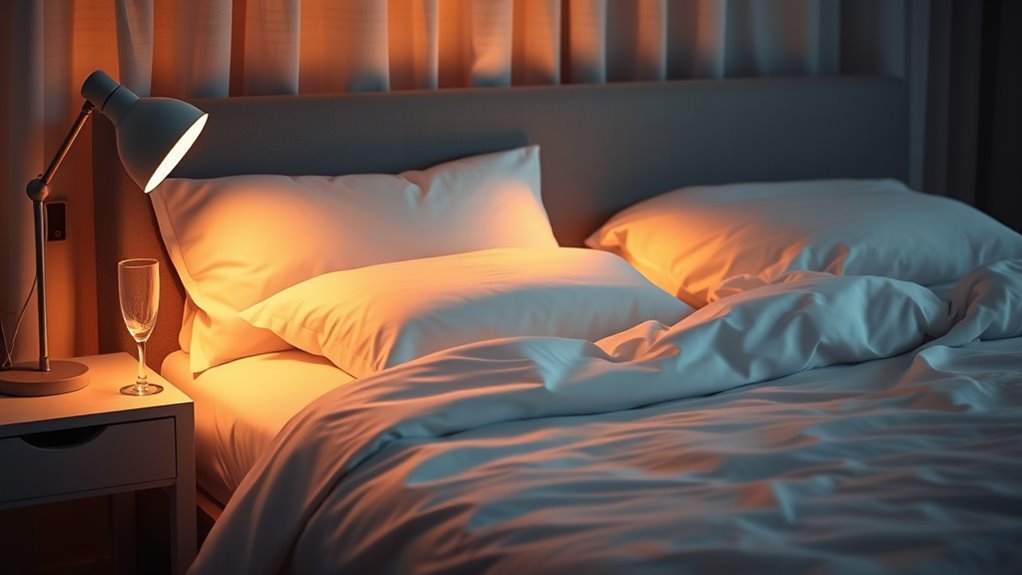
Understanding sleep hygiene is essential because it directly impacts the quality of your sleep and overall health. Good sleep hygiene involves habits and routines that promote restful sleep and reduce the risk of sleep disorders. When you prioritize sleep hygiene, you can experience better sleep quality, which helps your body recover and function at its best. Poor sleep hygiene can lead to sleep disturbances, making it harder to fall asleep or stay asleep, and increasing your vulnerability to sleep disorders like insomnia. By establishing healthy habits—such as avoiding caffeine before bed or creating a relaxing environment—you set the stage for restorative sleep. Additionally, understanding celebrity transformations can inspire you to adopt positive lifestyle changes that enhance your well-being. Prioritizing sleep hygiene not only improves your nightly rest but also supports your mental and physical well-being in the long run.

TOPOINT Sleep Mask with Headphones Bluetooth 5.4 Wireless, Sleep Headphones Earphones Earbuds with Microphone HD Speakers Music, Blackout Eye Mask for Sleeping Travel Meditation Men Women Cool Gadgets
99.99% LIGHT BLOCK OUT: This bluetooth sleep mask for side sleepers adopt bending cartilage design, adjustable and durable....
As an affiliate, we earn on qualifying purchases.
Creating a Consistent Sleep Schedule

Establishing a consistent sleep schedule helps your body know when to wind down and wake up. Make it a habit to go to bed and wake up at the same times every day, even on weekends. Also, avoid drinking caffeine late in the day, as it can interfere with falling asleep. Incorporating sleep routine habits can further reinforce your body’s internal clock and improve sleep quality.
Set Regular Bedtimes
Setting a regular bedtime helps your body develop a consistent sleep rhythm, making it easier to fall asleep and wake up feeling refreshed. To reinforce this, establish bedtime rituals that signal to your brain it’s time to wind down, like reading or gentle stretching. Consistency is key—going to bed at the same time each night helps regulate your internal clock. Using sleep tracking can help identify patterns and ensure you’re getting enough rest. By sticking to a set bedtime, you’ll train your body to expect sleep at a certain time, reducing tossing and turning. Over time, this habit improves sleep quality and makes waking up easier. Maintaining a consistent sleep schedule supports overall health and helps you feel more energized during the day.
Avoid Late-Night Caffeine
Consuming caffeine late in the day can disrupt your sleep schedule and make it harder to fall asleep at your set bedtime. Caffeine timing is essential because it blocks adenosine, the chemical that promotes sleep, giving you stimulant effects that last for hours. If you drink coffee or tea too late, these effects can linger, delaying your ability to relax and fall asleep. To maintain a consistent sleep schedule, avoid caffeine at least 6 hours before bedtime. This helps your body metabolize it fully and prevents it from interfering with your sleep cycle. Additionally, understanding the impact of contrast ratio on sleep environments can help you create a darker, more conducive setting for rest. By being mindful of caffeine timing, you support your body’s natural rhythms, making it easier to fall asleep and wake up refreshed.

MUSICOZY Sleep Headphones Bluetooth 5.4 Headband, Sports Wireless Earphones Sweat Resistant Earbuds Sleeping Headphone with Ultra-Thin HD Stereo Speaker for Workout Running Cool Gadgets Unique Gifts
2 in 1 Sleep & Sports Headband - The Bluetooth Headband enables you to enjoy music without wearing...
As an affiliate, we earn on qualifying purchases.
Optimizing Your Bedroom Environment
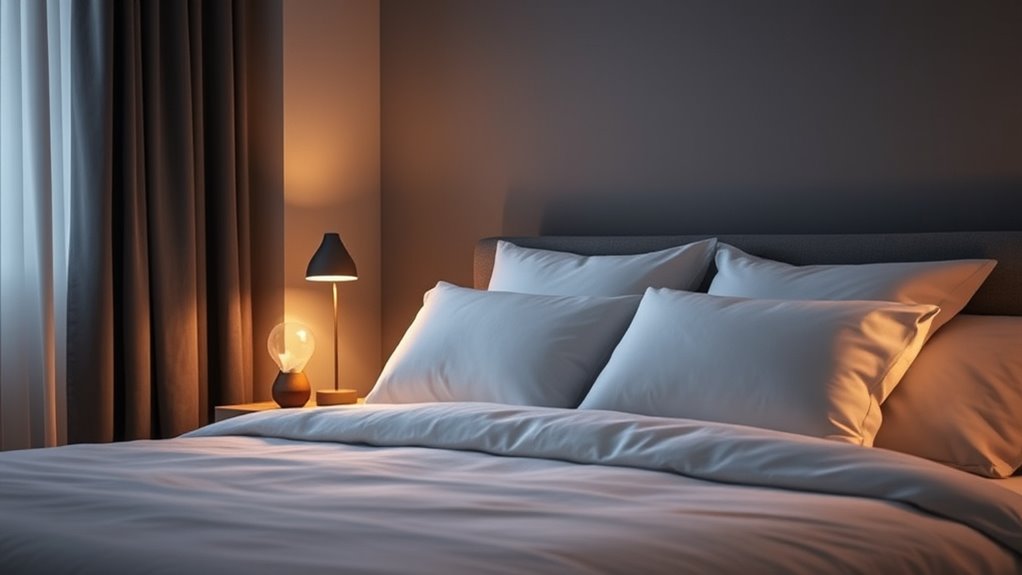
To improve your sleep, focus on creating a comfortable bedroom environment. Keep the room temperature cool and consistent to help you fall asleep faster. Also, eliminate noise distractions to guarantee uninterrupted rest throughout the night. Incorporating AI-driven environmental control systems can further optimize your bedroom conditions for better sleep.
Ideal Room Temperature
Maintaining the right room temperature is essential for a good night’s sleep, as it helps your body regulate its core temperature and promotes relaxation. Optimal temperature regulation creates an environment where your body can shift smoothly into sleep without feeling too hot or cold. Generally, a bedroom temperature between 60-67°F (15-19°C) offers the best ambient comfort for most people. If it’s too warm, your body struggles to cool down, making it harder to fall asleep and stay asleep. Conversely, if it’s too cold, your body works harder to stay warm, disrupting rest. Adjust your thermostat accordingly and consider using fans or space heaters if needed. Achieving the right room temperature helps you sleep soundly and wake refreshed. Environmental factors such as humidity levels also play a role in sleep quality, so maintaining a comfortable humidity can further enhance your sleep environment.
Minimize Noise Distractions
A quiet bedroom environment plays a significant role in improving sleep quality. To minimize noise distractions, consider using white noise machines or fans to mask disruptive sounds. Earplugs are also effective for blocking out sudden noises or persistent disturbances. Creating a peaceful space helps your mind relax and fall asleep faster. Incorporating soundproofing techniques into your room can further enhance noise reduction efforts.

Ozlo Sleepbuds® | Comfortable Side Sleeper Headphones | Up to 10 Hours of Bluetooth LE Streaming | Science-Backed Sleep Sounds | Snore Blocking Comfortable Earbuds
CLINICALLY PROVEN: Our Sleep Technology is Clinically Proven to Help You Fall Asleep Faster and Stay Asleep Longer,...
As an affiliate, we earn on qualifying purchases.
Establishing Relaxing Bedtime Routines
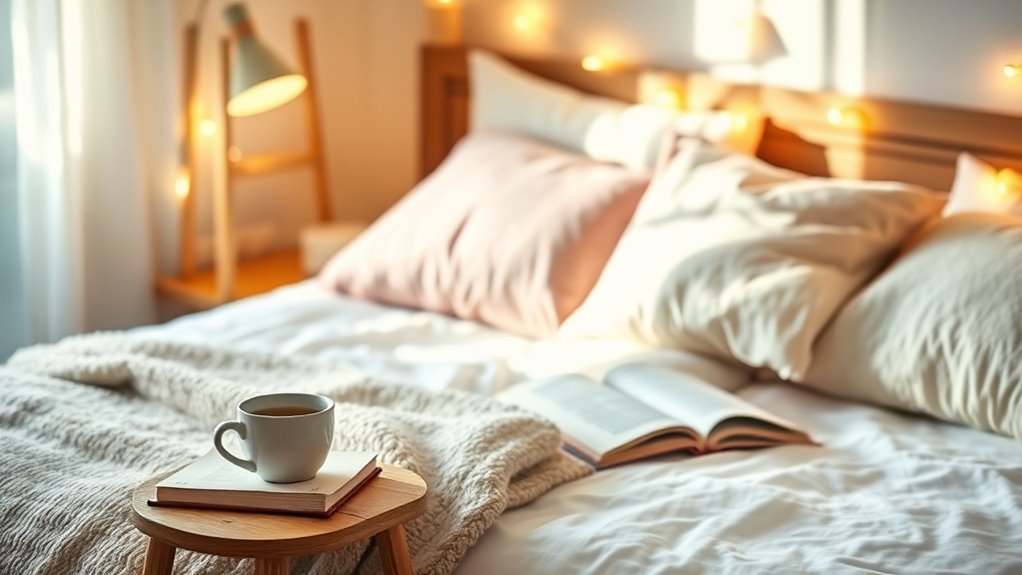
Creating a relaxing bedtime routine can considerably improve your ability to fall asleep and stay asleep throughout the night. Incorporating relaxation techniques into your nightly rituals helps signal to your body that it’s time to wind down. Activities like gentle stretching, deep breathing, or listening to calming music can reduce stress and ease your progression into sleep. Establishing consistent bedtime rituals, such as dimming the lights or reading a few pages of a book, also creates a sense of routine that promotes relaxation. Avoid screens and stimulating activities close to bedtime, as they can interfere with your wind-down process. By intentionally crafting these calming routines, you set the stage for restful, uninterrupted sleep and improve your overall sleep hygiene. Additionally, understanding the importance of sleep environment can further enhance the quality of your rest.
Managing Food and Beverage Intake Before Bed
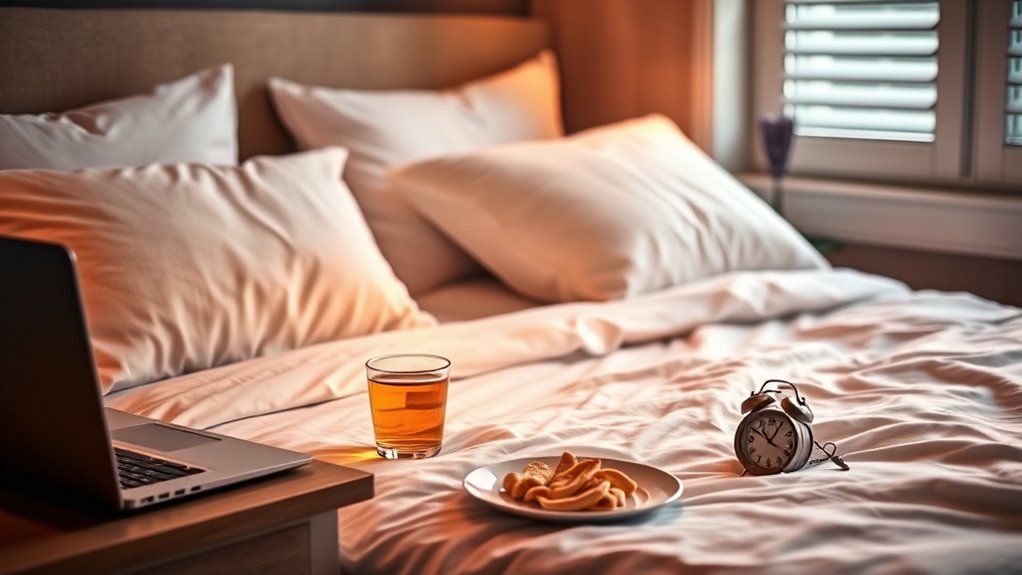
Consuming certain foods and beverages before bed can considerably impact your sleep quality. Late-night snacking, especially on heavy or spicy foods, can cause discomfort or indigestion, making it harder to fall asleep. Alcohol consumption might initially make you feel sleepy, but it often disrupts your sleep cycle, leading to restless nights and poor rest. To improve sleep hygiene, avoid heavy meals close to bedtime and limit alcohol intake in the evening. Instead, opt for light, easily digestible snacks if you’re hungry before bed. Staying mindful of what and when you eat helps regulate your sleep patterns, ensuring you wake up feeling more rested and alert. Managing your food and beverage intake before bed is a simple yet effective step toward healthier sleep. Regularly reviewing and adjusting your habits can further enhance your sleep quality by aligning with SQA Best Practices.
Limiting Screen Time and Blue Light Exposure
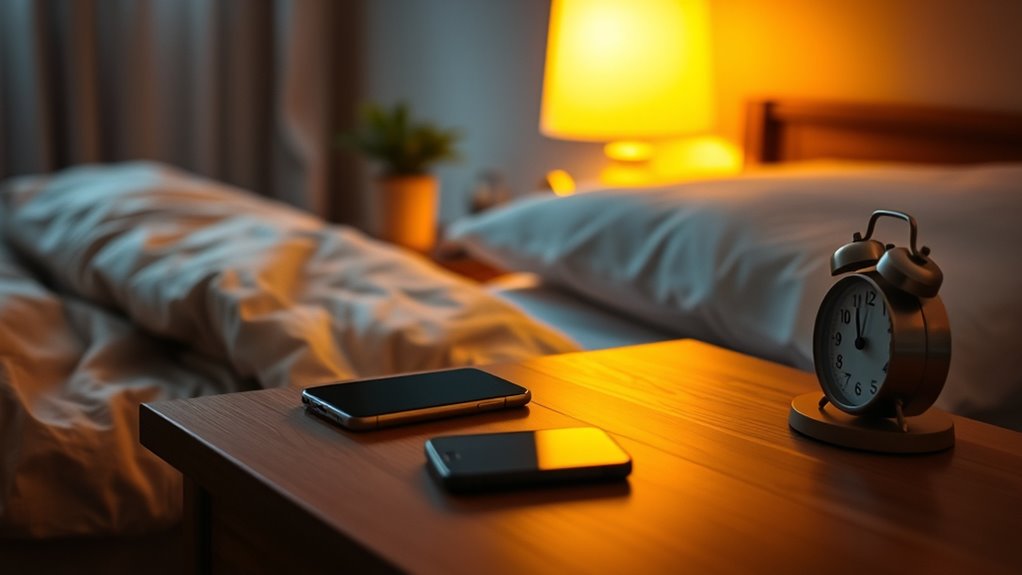
Since blue light from screens can interfere with your body’s natural sleep signals, limiting screen time before bed is essential for better sleep. Excessive exposure to blue light suppresses melatonin production, making it harder to fall asleep. To reduce this impact, consider the following:
- Turn off screens at least 30 minutes before bedtime
- Use blue light filters or glasses when using devices in the evening
- Replace screen time with relaxing activities like reading or meditation
- Dim your device’s brightness in the hours leading up to sleep
- Avoid engaging with stimulating content that can delay sleep onset
- Additionally, using blue light filters on devices or headphones can help minimize blue light exposure during evening hours.
Incorporating Physical Activity Into Your Day
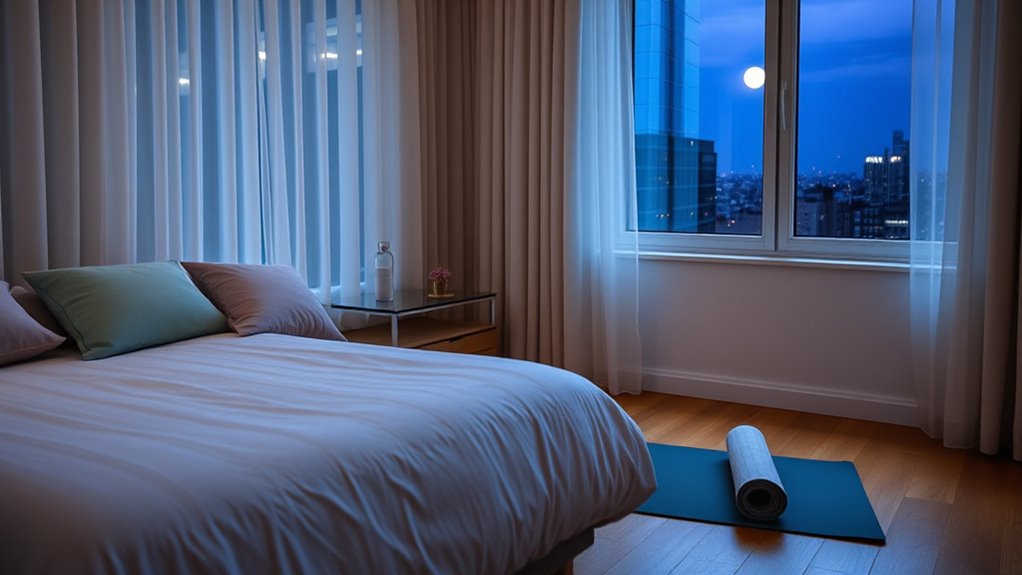
Reducing screen time before bed can help improve sleep quality, but incorporating physical activity into your daily routine also plays a vital role in achieving restful sleep. Regular exercise routines boost your overall sleep quality by helping you fall asleep faster and enjoy deeper rest. Aim for at least 30 minutes of moderate physical activity most days, such as brisk walking, cycling, or yoga. Consistent physical activity not only tires your body in a healthy way but also regulates your sleep-wake cycle. Additionally, choosing appropriate performance upgrades can further enhance overall well-being. However, avoid vigorous workouts close to bedtime, as they can interfere with sleep. Incorporating physical activity into your day creates a healthier balance, making it easier to relax and unwind at night, ultimately supporting better sleep hygiene.
Addressing Stress and Anxiety for Better Sleep

Stress and anxiety can considerably disrupt your sleep, making it harder to fall asleep and stay asleep throughout the night. To improve your sleep hygiene, focus on managing these feelings with effective stress reduction strategies. Practicing mindfulness techniques, like deep breathing or meditation, helps calm your mind before bedtime. Incorporate relaxing activities such as gentle stretching or listening to calming music. Avoid screens and stimulants close to bedtime, and create a peaceful sleep environment. Additionally, consider journaling your worries earlier in the evening to release built-up tension. Implementing these stress management techniques fosters a sense of calm, making it easier to *shift* into restful sleep. Regularly practicing relaxation techniques can enhance your ability to unwind and prepare for sleep. Consistently applying these strategies can *notably* enhance your sleep quality and overall well-being.
Tracking Your Sleep and Making Adjustments
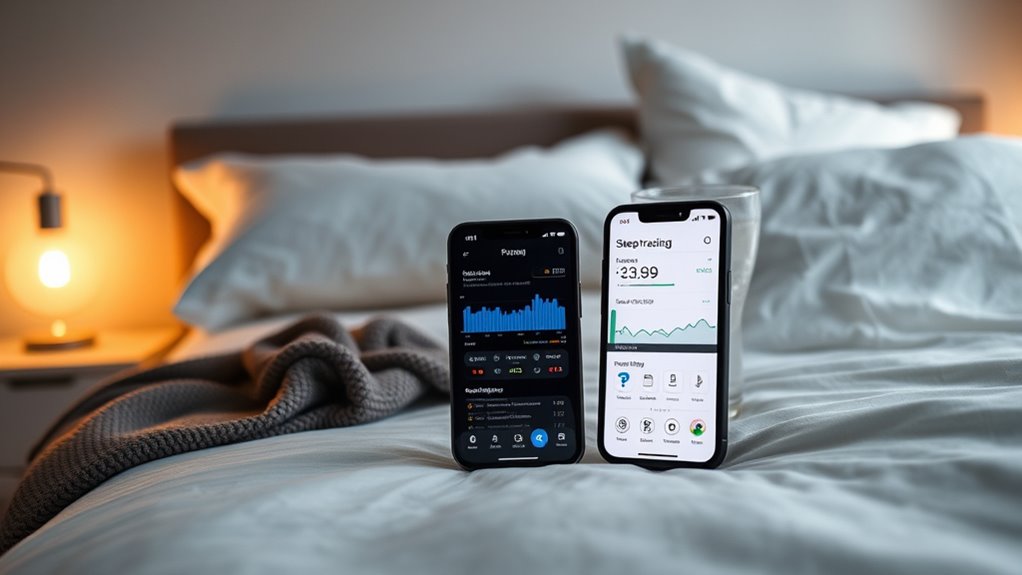
Tracking your sleep patterns is a vital step toward improving your sleep hygiene because it helps you identify habits and issues that may be disrupting your rest. By doing regular sleep pattern analysis, you can spot trends like inconsistent bedtimes, nighttime awakenings, or poor sleep duration. Once you understand these patterns, you can implement adjustment strategies to enhance your sleep quality. For example, if you notice you’re awake late, try shifting your bedtime earlier or reducing screen time before bed. Adjustments might also include optimizing your sleep environment or establishing a calming pre-sleep routine. Monitoring your progress allows you to fine-tune these strategies over time, ensuring you create a sleep-friendly routine that consistently supports restorative rest. Incorporating sleep tracking tools can provide more precise insights and help you tailor your habits more effectively.
Frequently Asked Questions
How Long Does It Typically Take to See Improvements From Better Sleep Hygiene?
When you start improving your sleep hygiene, you might wonder about the sleep improvement timeline. Typically, it takes about one to two weeks for noticeable changes, but significant progress often occurs within a month. Keep in mind, everyone’s habits adjustment period varies. Consistently sticking to your new routines accelerates the process. Patience and perseverance are key to experiencing the full benefits of better sleep habits.
Can Sleep Hygiene Habits Help With Specific Sleep Disorders Like Insomnia?
Did you know that nearly 30% of adults experience insomnia? Sleep hygiene habits like optimizing your sleep environment—keeping it cool, dark, and quiet—can considerably help. Incorporate relaxation techniques such as deep breathing or meditation before bed. While these habits won’t cure severe insomnia, they can improve sleep quality and reduce symptoms, making it easier to fall asleep and stay asleep. Consistent practice is key to seeing benefits over time.
Are There Cultural Differences in Sleep Hygiene Practices Worldwide?
You’ll notice that cultural rituals and sleep customs vary worldwide, influencing how people approach bedtime routines. For example, some cultures value evening socializing, while others prioritize early bedtimes. These differences shape sleep habits and perceptions of rest. By understanding these cultural variations, you can adapt your sleep hygiene practices to fit your background, improving your overall sleep quality and respecting diverse traditions that influence sleep behaviors across the globe.
How Do Age-Related Changes Affect Sleep Hygiene Strategies?
As you age, age-related changes can alter your sleep pattern, making it harder to fall asleep or stay asleep. You might find you need to modify your sleep hygiene strategies by sticking to a consistent bedtime, avoiding caffeine late in the day, and creating a calming pre-sleep routine. Recognizing these changes helps you develop better habits and ensures you get restful sleep despite the natural shifts in your sleep pattern.
What Are the Common Mistakes People Make When Trying to Improve Sleep Hygiene?
You might think you’re doing everything right, but many fall for sleep myths that sabotage their efforts. Common mistakes include ignoring consistent bedtime routines or believing caffeine doesn’t affect sleep. You may also stay in bed awake, hoping sleep will come magically. These errors keep you stuck in a cycle of poor sleep habits. Avoid these pitfalls, stick to a relaxing bedtime routine, and challenge those sleep myths for better rest.
Conclusion
By weaving these sleep habits into your nightly routine, you create a sanctuary of calm where your mind can drift gently into restful slumber. Imagine slipping between soft, cool sheets as the world outside fades into quiet darkness, your body recharging beneath a tranquil sky. Embrace these mindful practices, and watch as your nights become peaceful retreats—renewing your energy and illuminating your days with clarity and vigor. Sleep well, and let tranquility be your guiding light.









